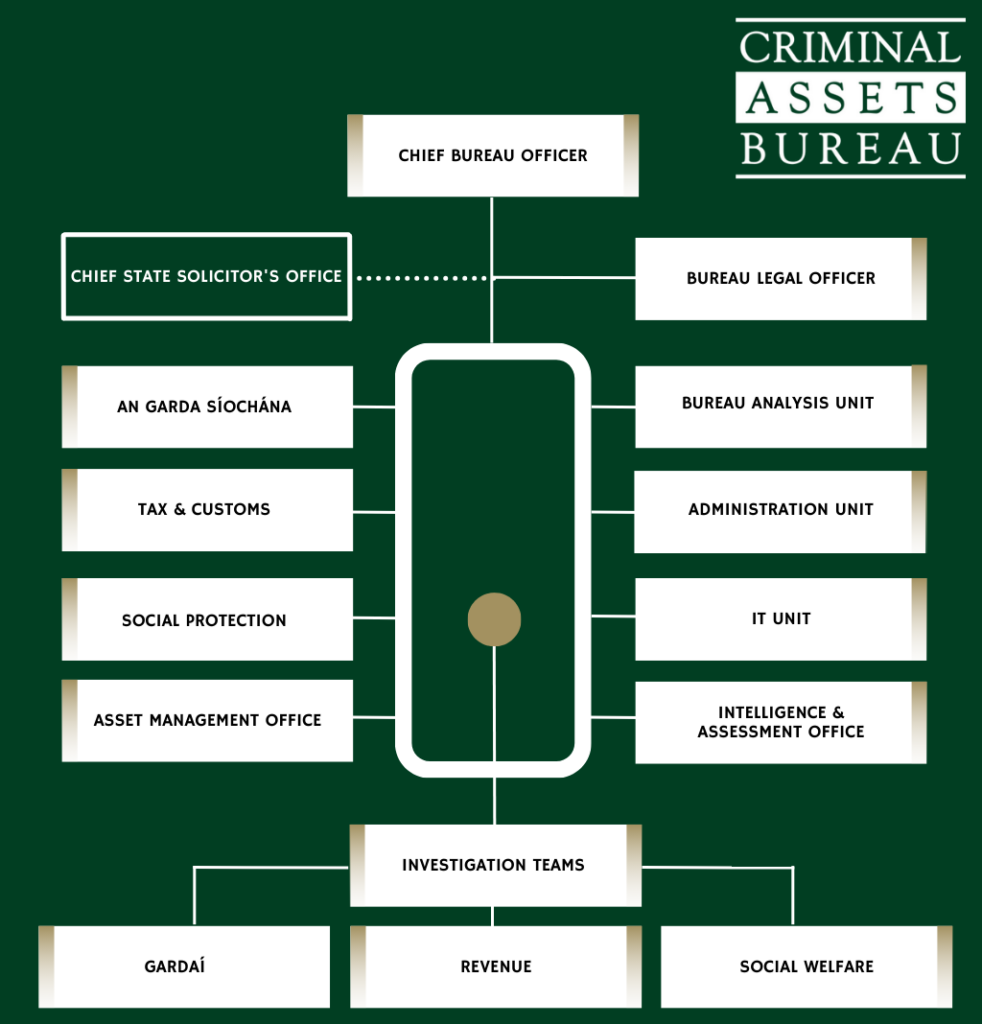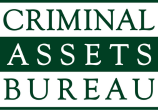The Criminal Assets Bureau was established on the 15 October 1996 as an independent statutory body by enactment of the Criminal Assets Bureau Act 1996. Its establishment followed the murders of Detective Garda Jerry McCabe and Journalist Veronica Guerin in June 1996.
The Bureau is a key part of the armoury of the State in tackling criminal activity, in particular serious and organised criminal activity. It seeks to deny and deprive criminals of assets acquired through criminal conduct. The range of criminal conduct is varied and includes drug trafficking, theft, burglary, fraud and money laundering.
The Criminal Assets Bureau is a body corporate with perpetual succession and an official seal. It has the power to sue and be sued in its corporate name. The Bureau also has the power to acquire, hold and dispose of land or an interest in land and to acquire, hold and dispose of any other property.
In accordance with relevant legislation, all monies collected by the Criminal Assets Bureau are transferred to the Exchequer for the benefit of the Central Fund.
Sale and Disposal of Seized Assets
The sale/disposal of all seized assets are dealt with on a case by case basis and in accordance with the order(s) of the High Court. These orders can specify the method/type of sale, the required approval and/or other stipulations as the Court views appropriate.
Bureau Functions
The functions of the Bureau are set out at Section 5 of the Criminal Assets Bureau Act of 1996. In August of 2016, the Bureau welcomed the Proceeds of Crime (Amendment) Act, 2016. This amendment gave the Bureau two additional powers:
Who we are
The Criminal Assets Bureau is a multi-disciplinary body, made up of members of An Garda Síochána, officials from the Office of the Revenue Commissioners (Taxes and Customs), officials of the Department of Social Protection, together with staff from the Department of Justice, including the Bureau Legal Officer, Forensic Accountants, Financial Crime Analysts, IT experts and Administrative Staff.
The Criminal Assets Bureau is led by the Chief Bureau Officer (CBO). The current CBO is Detective Chief Superintendent Michael Gubbins. The CBO is appointed by the Garda Commissioner from the ranks of Chief Superintendent to carry, manage and control the administration and business of the Bureau. In the absence of the CBO, the Commissioner may appoint for the purpose of the functions of the Bureau an Acting Chief Bureau Officer. This person is generally the Detective Superintendent attached to the Bureau.
The Bureau Legal Officer (BLO) is a member of staff of the Criminal Assets Bureau appointed by the Minister for Justice with the consent of the Attorney General and Minister for Finance. The BLO reports directly to the Chief Bureau Officer with the purpose of assisting the Bureau in the pursuit of its objectives and functions. The current Bureau Legal Officer is Mr Kevin McMeel.
There are two categories of personnel attached to the Criminal Assets Bureau:
Statutory Anonymity
Section 10 of the Criminal Assets Bureau Act 1996 provides for the statutory anonymity of Bureau Officers and Bureau Staff. All non-Garda Bureau Officers and all Bureau staff (other than the Bureau Legal Officer) are provided with statutory anonymity. Such persons are referred to by a Code. For example RBO1 is used to identify the first Revenue Bureau Officer and BFA1 refers to the first Forensic Accountant. This convention is used for Bureau Officers when swearing affidavits and when giving evidence in Court. It is a criminal offence to identify a person who has statutory anonymity.
Our Teams
The Bureau currently has 7 Investigation Teams made up of members of An Garda Síochána, officials from Revenue Taxation, Revenue Customs and Department of Social Protection.
During 2017, the Bureau established an Intelligence and Assessment Office comprising of staff from An Garda Síochána and officials from the Office of the Revenue Commissioners (Taxes and Customs) supported by officials from the Department of Social Protection. The purpose of the Intelligence and Assessment Office is to engage with our Divisional Asset Profilers, to review profiles received and to assess and evaluate information received through Good Citizens Reports (GCR’s), along with information pertaining to Bureau targets in order to determine whether they should become full targets of the Bureau or otherwise.
The Bureau also established an Asset Management Office. This office comprises of members of An Garda Síochána and officials from the Revenue Commissioners, supported by officials from the Department of Social Protection. The purpose of the Asset Management Office is to manage forfeited assets, realise their value and to submit the proceeds to the Minister for Public Expenditure and Reform.
These, along with the Bureau Analysis Unit, the IT Unit and the Administration Unit are the teams we require to successfully carry out our statutory remit.
The Criminal Assets Section of the Chief State Solicitors office is co-located at the offices of the Criminal Assets Bureau. They provide legal advice and solicitor services to the Criminal Assets Bureau at all stages of case progression, from advice on investigation, to conveyancing services, for the disposal of confiscated property.
Organisational Chart

Divisional Asset Profiler Network
The Divisional Asset Profiler Network began in 2004. The role of the Divisional Asset Profiler is to identify potential targets within their divisions who may fit the criteria to become a target for investigation by the Bureau. There are currently 553 Divisional Asset Profilers throughout the State. These are primarily made up of members of An Garda Síochána, however they include personnel from the Office of the Revenue Commissioners (Taxes and Customs) and Social Protection. They are the eyes and the ears of the Criminal Assets Bureau across the country.
Good Citizens Reports
The Criminal Assets Bureau greatly appreciates the information provided by members of the public via Good Citizens Reports. These can be received in various ways, either by writing to the Bureau to Criminal Assets Bureau, Walter Scott House, Military Road, Dublin 8, D08 HE2P or by email to [email protected] or alternatively by phoning the Bureau on 01 666 3266 and asking to speak to a Garda Bureau Officer.
The Bureau is interested in any information in respect of unexplained wealth which is suspected to derive either directly or indirectly from criminal activity.
The benefit of giving information to the Criminal Assets Bureau in this way is that you can do so anonymously. The Bureau can pursue a line of enquiry on the simplest of information, without any official statement or details which may identify the person giving the information.
All information is sent through our Intelligence and Assessment Office to establish whether it falls within the statutory remit of the Criminal Assets Bureau.
Annual Report
Section 21 of the Criminal Assets Bureau Act, 1996 provides “As soon as may be, but not later than 6 months, after the end of each year, the Bureau shall through the Commissioner present a report to the Minister of its activities during that year and the Minister shall cause copies of the report to be laid before each House of the Oireachtas”.
The Bureau’s Annual Report for 2021 was laid before the Houses of the Oireachtas on the 8th July 2021. The 2021 Annual Report is the 26th Annual Report of the Bureau. This report outlines the activities of the Bureau during 2021, in the pursuit of its statutory remit; detailing actions brought under Proceeds of Crime, Revenue and Social Welfare legislation in successfully targeting the suspected proceeds of criminal conduct.
International Co-operation
The Bureau participates in and is a member of a number of international groups working in the area of identifying, tracing and seizing the proceeds of crime.
The Bureau is part of the Steering Committee of the Camden Asset Recovery Inter-Agency Network (CARIN). This is an informal network of contacts and co-operative group in the area of criminal asset identification and recovery.
The Bureau acts as the Asset Recovery Office (ARO) for Ireland.
Bureau Officers and staff attend at meetings of the Association of Law Enforcement Forensic Accounts (ALEFA), Cross Border Joint Agency Task Force (JATF), Anti Money Laundering Steering Committee (AMLSC), Financial Action Task Force (FATF), European Multidisciplinary Platform Against Criminal Threat (EMPACT), and the Cross Border Fuel and Tobacco Excise Group.
The Bureau cooperates with law enforcement such as the Police Service of Northern Ireland (PSNI), National Crime Agency (NCA), other UK Police Forces, Police Forces in Europe, North America and elsewhere. The Bureau regularly receives requests from colleagues in other jurisdictions for assistance and for study visits. In 2020, the Bureau continued its involvement as a member in two separate Joint Investigation Teams (JITs) established in accordance with Article 20 of the Second Additional Protocol of the European Convention on Mutual Assistance in Criminal Matters of the 20th April 1959.
Public Relations
The Bureau utilises the services of the Garda Press Office to keep the public informed about its activities. All media enquiries are also dealt with by the Garda Press Office on the Bureau’s behalf.
The Criminal Assets Bureau’s email address is [email protected] and its telephone number is 01 666 3266.
Find us on Facebook at www.facebook.com/criminalassetsbureau and on X at http://x.com/criminalassets
The Bureau is partnered with CRIMESTOPPERS. Freephone 1800 25 00 25 to facilitate the provision of information from members of the public.
